Interviews
Memory Formation Unveiled: An Interview with Sajikumar Sreedharan
“Our goal is to correct or rewire neural network activity so that memory can be preserved with minimal damage, especially during conditions such as aging, Alzheimer’s Disease, and mental health disorders.”

In an enlightening conversation with EdPublica, Sajikumar Sreedharan, Associate Professor at the NUS Yong Loo Lin School of Medicine, Singapore, shares his research insights on memory formation and the transition from short-term to long-term memory. His areas of research include aging and neurodegeneration, the neural basis of long-term memory (LTM), and synaptic tagging and capture (STC) as an elementary mechanism for storing LTM in neural networks. He also explores metaplasticity as a compensatory mechanism for improving memory in neural networks. With a career spanning over two decades, Prof. Sreedharan discusses his key findings, innovative methodologies, and the significance of receiving the “Investigator” award from the International Association for the Study of Neurons and Brain Diseases. Join us as he reflects on his journey and the collaborative spirit that drives his research.
Edited Excerpts:
Your research has been recognized for significantly advancing our understanding of memory formation. Could you elaborate on your key findings related to the transition from short-term to long-term memory?
I have been working in the field of learning and memory since 2000. My first mentor in neuroscience was Prof. T. Ramakrishna, the founder and first head of the Life Sciences Department at the University of Calicut, Kerala, India. He was a great motivator, and we often had insightful discussions about learning and memory in the evenings. I had the chance to work with him for my master’s dissertation, which was my first real research experience. Prof. Ramakrishna encouraged me to expand my knowledge further, and he connected me with Dr. Shobi Valeri, a senior researcher in Delhi at the time.
Dr. Shobi soon left for Germany to pursue his Ph.D. and recommended me to DRDO (Defence Research and Development Organisation). Dr. Shobi is now a senior scientist at the National Institute of Nutrition in Hyderabad. I worked at DRDO for a year before moving to Magdeburg, Germany, where I began my Ph.D. under Prof. Juletta Frey. She is well-known in the field of learning and memory, particularly for her research on the cellular mechanisms involved in forming associative memory.
In Prof. Frey’s lab, I discovered how different pieces of information can link together to form long-term memories. This work later inspired the development of many computational models of memory. After completing my Ph.D., I did my postdoctoral studies with Prof. Martin Korte in Braunschweig. There, I discovered how activating neurons before learning could enhance memory formation in the future, a process known as metaplasticity—an exciting and emerging area of neuroscience.
“Using animal models, we have uncovered the role of specific brain regions, like CA2 and CA1, in forming social and spatial memories—both of which are significantly affected by aging, neurodegenerative diseases, and mental health conditions
Since 2012, I have been working at the National University of Singapore, where I have focused more on aging, neurodegeneration, and mental health. Using animal models, we have uncovered the role of specific brain regions, like CA2 and CA1, in forming social and spatial memories—both of which are significantly affected by aging, neurodegenerative diseases, and mental health conditions.
How do you approach the study of molecular mechanisms in memory, and what methodologies do you find most effective?
In my lab, we approach research questions by examining them from different angles—molecular, cellular, behavioural, and system-level. We choose the most appropriate method depending on the specific question we’re investigating. I can’t say that one method is better than the others because each plays an important role in confirming our findings.
Recently, we’ve been using optogenetic and chemogenetic tools, which allow us to target and stimulate specific neurons. These methods are particularly helpful because they ensure precision in how we activate or deactivate brain cells.
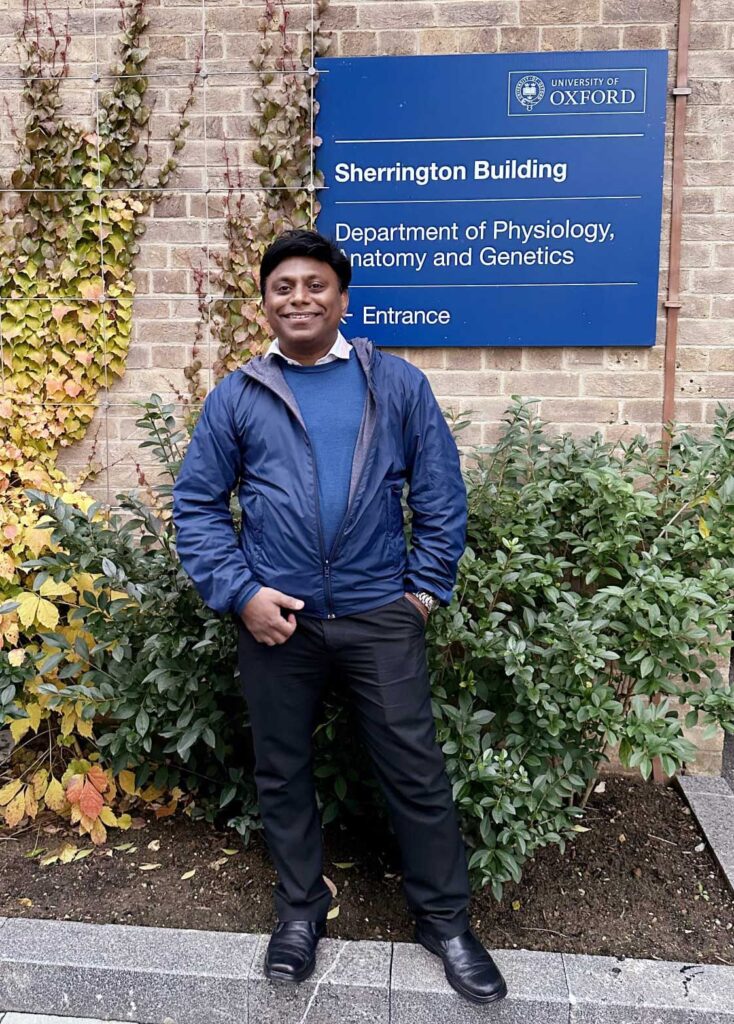
Congrats on receiving the “Investigator” award from the International Association for the Study of Neurons and Brain Diseases. What does this recognition mean to you personally and professionally?
Thank you for your kind words. As a researcher, I feel proud and happy that my work is being recognized internationally. Professionally, this recognition is a significant motivation to continue pursuing my research.
This achievement is not just mine alone—I owe it to all my Ph.D. students, postdocs, and research technicians who have worked with me over the past 20 years. This award is for them as well.
How do you feel your work contributes to the broader scientific community, especially concerning memory impairments related to aging and mental health?
I am the Research Director of the Healthy Longevity Translational Research Programme at the School of Medicine, National University of Singapore, where we have more than 36 scientists working on various aspects of healthy aging. One of our key areas is brain health. Living a long life is not meaningful without a healthy brain.

I am one of the principal investigators studying how neural networks are impaired during aging and neurodegeneration. My wife, Dr. Sheeja Navakkode, is also a neuroscientist, focusing on Alzheimer’s disease using animal models. Neural networks undergo tremendous changes during aging and in various mental health conditions. Our goal is to correct or rewire neural network activity so that memory can be preserved with minimal damage, especially during conditions such as aging, Alzheimer’s Disease, and mental health disorders.
(Read the full interview in the upcoming December 2024 issue of EdPublica magazine.)
Interviews
Dr. Saji Kumar Sreedharan’s Quest to Restore Memory in Aging and Disease
Dr. Saji Kumar Sreedharan’s work has significantly contributed to our understanding of long-term memory storage, the neural basis of memory, and the impact of aging on memory function
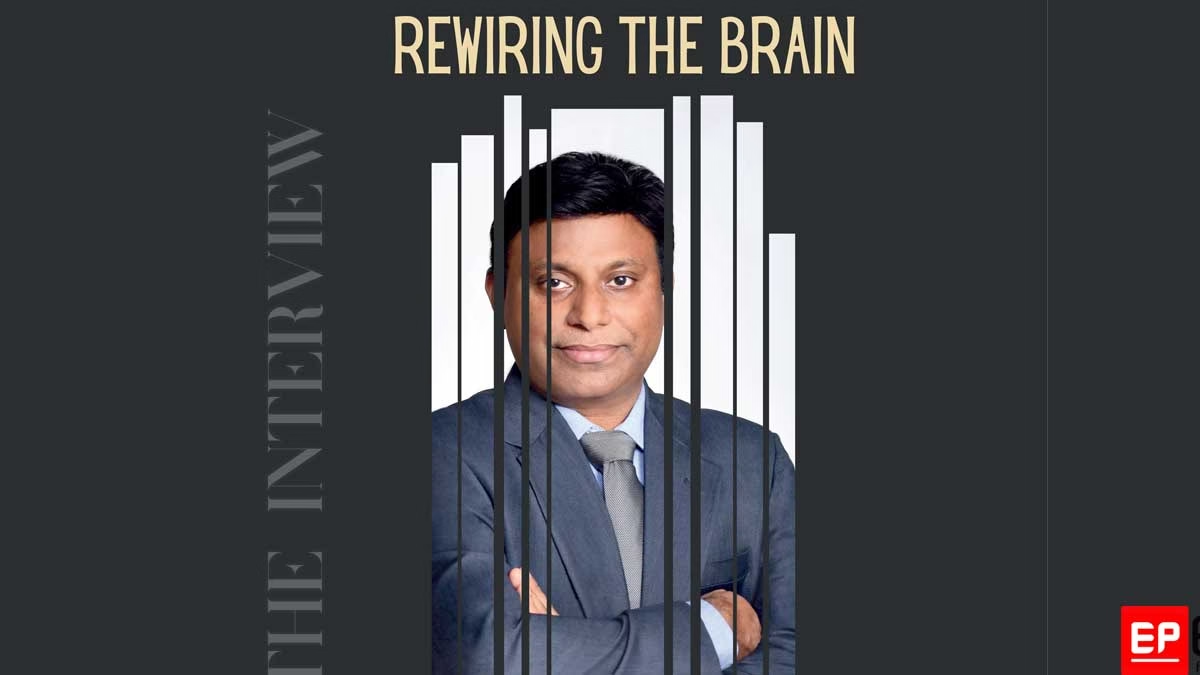
Dr. Saji Kumar Sreedharan is an Associate Professor in the Department of Physiology at the National University of Singapore, where he leads research focused on healthy aging and neurodegeneration. His work has significantly contributed to our understanding of long-term memory storage, the neural basis of memory, and the impact of aging on memory function. A pioneer in exploring the molecular and cellular mechanisms behind memory processes, Dr. Sreedharan’s research utilizes advanced tools like optogenetics and chemogenetics to manipulate and study neural networks. He is particularly interested in finding ways to “rewire” or restore the neural networks to preserve memory function in conditions like Alzheimer’s and mental health disorders.
In an interview with EdPublica’s Dipin Damodharan, Dr. Saji Kumar Sreedharan shares insights into his journey into neuroscience, the challenges and breakthroughs in memory research, and his vision for the future of the field. Meet the man unraveling the mysteries of memory: excerpts from Dr. Saji Kumar Sreedharan’s exploration of the brain’s secrets.

Q: Can you tell us about your journey into the field of neuroscience? What initially sparked your interest in memory research?
I was born and raised in a small village called Chingoli in Alappuzha, near Haripad in Kerala, India. My home was close to a lake, and from a young age, I observed the seasonal changes that happened there. The lake is brackish, meaning saltwater and freshwater exchange every six months. With these changes came noticeable shifts in the plants and animals around the lake. I used to document these changes out of curiosity.
One particular observation was the abundance of a reptile, the skink (arana in local language), in our area. My mother would often warn me to be cautious around skinks, saying that if one bit you, death was certain. At the same time, she also mentioned that skinks never actually bite because they forget their intention within a few seconds. This curious idea sparked my interest, and I asked her why skinks forget everything so quickly. She explained it was due to how their brain is designed and told me that, when I grew up, I could learn more about how the brain stores memories.
Her words stayed with me, and I began reading many books on the brain and memory. This was my first spark of inspiration, and it eventually led me into the field of neuroscience.
Q: Over the past two decades, what specific experiences or challenges have shaped your research focus on long-term memory storage?
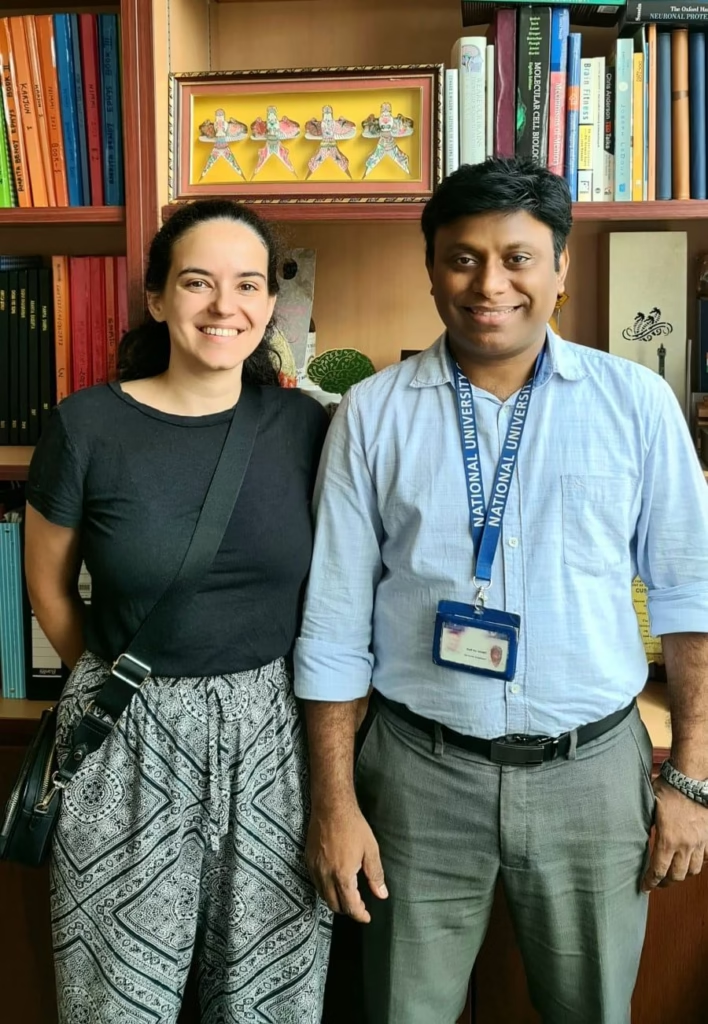
The world is advancing rapidly, thanks to scientific discoveries. These breakthroughs are possible because of the incredible abilities of our brains, where our neural networks fuel imagination and creativity. Neuroscience, in particular, is a field that uses new techniques to explore the basic workings of memory.
In the past two decades, methods like optogenetics and chemogenetics have given neuroscientists powerful tools to study memory. Optogenetics is a technique where scientists use light to turn specific brain cells on or off, which normally wouldn’t respond to light. Chemogenetics, on the other hand, allows scientists to activate or deactivate neurons by adding specific chemicals.
These techniques bring both challenges and opportunities. Now, we can target and control specific areas of the brain. For example, imagine a person with psychological issues receiving optogenetic or chemogenetic stimulation in specific brain regions to help manage their emotions and behavior—this could be incredibly useful. While this is currently being tested in animal models, I hope that, in the near future, it could be used to help humans as well.
Q: Your research has been recognized for significantly advancing our understanding of memory formation. Could you elaborate on your key findings related to the transition from short-term to long-term memory?

I have been working in the field of learning and memory since 2000. My first mentor in neuroscience was Prof. T. Ramakrishna, the founder and first head of the Life Sciences Department at the University of Calicut, India. He was a great motivator, and we often had insightful discussions about learning and memory in the evenings. I had the chance to work with him for my master’s dissertation, which was my first real research experience. Prof. Ramakrishna encouraged me to expand my knowledge further, and he connected me with Dr. Shobi Valeri, a senior researcher in Delhi at the time.
Dr. Shobi soon left for Germany to pursue his Ph.D. and recommended me to DRDO (Defence Research and Development Organisation). Dr. Shobi is now a senior scientist at the National Institute of Nutrition in Hyderabad. I worked at DRDO for a year before moving to Magdeburg, Germany, where I began my Ph.D. under Prof. Juletta Frey. She is well-known in the field of learning and memory, particularly for her research on the cellular mechanisms involved in forming associative memory.

In Prof. Frey’s lab, I discovered how different pieces of information can link together to form long-term memories. This work later inspired the development of many computational models of memory. After completing my Ph.D., I did my postdoctoral studies with Prof. Martin Korte in Braunschweig. There, I discovered how activating neurons before learning could enhance memory formation in the future, a process known as metaplasticity—an exciting and emerging area of neuroscience.
Since 2012, I have been working at the National University of Singapore, where I have focused more on aging, neurodegeneration, and mental health. Using animal models, we have uncovered the role of specific brain regions, like CA2 and CA1, in forming social and spatial memories—both of which are significantly affected by aging, neurodegenerative diseases, and mental health conditions.
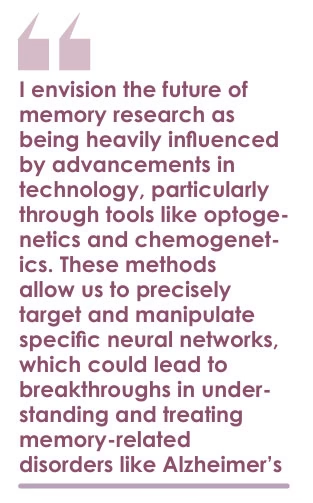
Q: How do you approach the study of molecular mechanisms in memory, and what methodologies do you find most effective?
In my lab, we approach research questions by looking at them from different angles—molecular, cellular, behavioural, and system-level. We choose the most appropriate method depending on the specific question we’re investigating. I can’t say that one method is better than the others because each plays an important role in confirming our findings.
Recently, we’ve been using optogenetic and chemogenetic tools, which allow us to target and stimulate specific neurons. These methods are particularly helpful because they ensure precision in how we activate or deactivate brain cells.
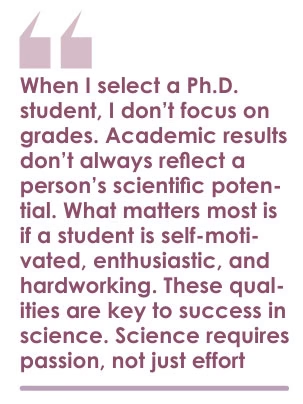
Q: Congratulations on receiving the “Investigator” award from the International Association for the Study of Neurons and Brain Diseases. What does this recognition mean to you personally and professionally?
Thank you for your kind words. As a researcher, I feel proud and happy that my work is being recognized internationally. Professionally, this recognition is a big motivation to continue pursuing my research.
This achievement is not just mine alone—I owe it to all my Ph.D. students, postdocs, and research technicians who have worked with me over the past 20 years. This award is for them as well.
Q: How do you feel your work contributes to the broader scientific community, especially concerning memory impairments related to aging and mental health?
I am the Research Director of the Healthy Longevity Translational Research Programme at the School of Medicine, National University of Singapore, where we have more than 36 scientists working on various aspects of healthy aging. One of our key areas is brain health. Living a long life is not meaningful without a healthy brain.
I am one of the principal investigators studying how neural networks are impaired during aging and neurodegeneration. My wife, Dr. Sheeja Navakkode, is also a neuroscientist, focusing on Alzheimer’s disease using animal models. Neural networks undergo tremendous changes during aging and in various mental health conditions. Our goal is to correct or rewire neural network activity so that memory can be preserved with minimal damage, especially during conditions such as aging, Alzheimer’s Disease, and mental health disorders.

Q: Looking ahead, what are some of the new directions or questions in memory research that you are excited to explore?
Looking ahead, I’m excited to explore several new directions in memory research. One of the key areas of interest is how neural networks in the brain change during aging and neurodegenerative diseases. I’m particularly interested in finding ways to “rewire” or restore these networks to preserve memory function in conditions like Alzheimer’s and mental health disorders. Additionally, using advanced tools like optogenetics and chemogenetics, we can now target specific brain regions with precision, opening up possibilities to understand how different areas of the brain contribute to memory formation and retrieval.
Q: How do you envision the future of memory research, particularly in relation to technology and treatment for memory-related disorders?
I envision the future of memory research as being heavily influenced by advancements in technology, particularly through tools like optogenetics and chemogenetics. These methods allow us to precisely target and manipulate specific neural networks, which could lead to breakthroughs in understanding and treating memory-related disorders like Alzheimer’s. As we continue to explore how neural networks change with aging and neurodegeneration, we can potentially develop targeted therapies to restore or enhance memory function, offering hope for effective treatments in the future.
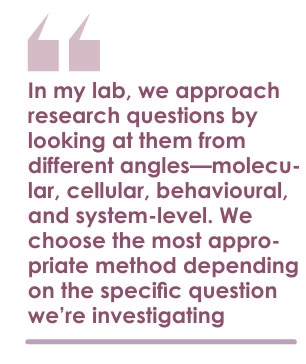
Q: What advice would you give to young researchers who aspire to make significant contributions to the field of neuroscience?
My advice to young researchers is to find a mentor who inspires you and helps nurture your curiosity. A good mentor can shape your scientific journey in ways you might not even realize. Focus on being self-motivated, enthusiastic, and hardworking—these qualities matter more than grades or academic achievements. Science requires passion, not just effort. If you’re truly curious and dedicated, you won’t waste time complaining; you’ll immerse yourself in the work. Always approach your research with the mindset of a lifelong learner, and remember, science is not just a job—it’s a passion that drives discovery and innovation.
Q: Finally, how do you balance the demands of research, teaching, and mentorship in your role as an Associate Professor?
Balancing the demands of research, teaching, and mentorship as an Associate Professor requires careful prioritization and passion for each role. In research, I stay focused on exciting new directions in memory studies and neurodegeneration while managing a team of talented scientists. In teaching, I aim to inspire students by sharing my enthusiasm for neuroscience and guiding them through complex concepts. Mentorship is one of the most fulfilling aspects of my career, where I focus on nurturing curiosity and passion in my students, helping them grow both personally and professionally. Ultimately, I approach all three areas with the mindset of a lifelong learner, driven by a deep love for science and a commitment to making a meaningful impact.
Interviews
‘Significant under-representation of black women in academic and research leadership’
Addressing the significant underrepresentation of Black women in senior academic and research leadership roles in the country, Dr Claudia Ntsapi discusses her latest research, the challenges faced by women in science, and more in an interview with EdPublica.

She has drawn recent attention for her ground-breaking research initiative related to neurodegenerative diseases. Her work explores the potential benefits of medicinal plants as supplementary treatments for neurodegenerative diseases such as Alzheimer’s, Parkinson’s, and Huntington’s. In this edition of ‘EdPublica’s Women in Science’ column, we introduce Dr Claudia Ntsapi, a researcher at the University of the Free State (UFS) in South Africa. Addressing the significant underrepresentation of Black women in senior academic and research leadership roles in the country, she discusses her latest research, the challenges faced by women in science, and more in an exclusive interview with EdPublica.
Dr Ntsapi, PhD, is a registered Natural Scientist (Pri. Sci. Nat) with the South African Council for Natural Scientific Professions (SACNASP). She joined the University of the Free State in late 2019 as a lecturer in the Department of Basic Medical Sciences. In addition to her teaching responsibilities, Dr Ntsapi leads the NeuroCancer Research Group, overseeing a multidisciplinary team specialising in cell biology, cell physiology, microscopy, biochemistry, and pharmaceutical methodologies.
Could you share details about your educational journey and current professional role?
I acquired my undergraduate and postgraduate qualifications at Stellenbosch University, completing a Master of Medical Science in Human Genetics in 2015 and a PhD in Physiological Sciences with a specialization in Neurophysiology in 2018. My current job profile is that of a Senior Lecturer at the University of the Free State’s Faculty of Health Sciences, within the School of Biomedical Sciences, Department of Basic Medical Sciences. In this role, I occupy administrative, academic, research, and leadership positions at both faculty and institutional levels.
“I admired professionals in lab coats and their selfless passion for finding answers and solutions to health-related conditions that remain clinical challenges using scientific methods and evidence
What sparked your interest in pursuing the Sciences, and what were your career aspirations?
As a high school learner, my academic strengths and interests were in chemistry, math, and biological sciences. While I was initially unsure about the exact career field I wanted to pursue, I was inherently curious and fascinated by professionals working in laboratories. I was a huge fan of TV series such as CSI: Crime Scene Investigation, which follows a team of forensic investigators solving crimes using scientific methods and evidence, and Numbers, which combined crime-solving with mathematics. These shows inspired me to aspire to a field reminiscent of what I witnessed in these series. I admired professionals in lab coats and their selfless passion for finding answers and solutions to health-related conditions that remain clinical challenges using scientific methods and evidence. True to my nature as an introvert, I continue to find myself most “at home” when working in a laboratory setting. While I could not have imagined the trajectory that my academic career would take, I am without a doubt in the right profession given my innate curiosity, passion for teaching, skills transfer, and biomedical research.
What do you think about the current status of women in science careers in your country?

Despite the gains in women’s participation in science careers in South Africa, women remain underrepresented in these fields. While there has been significant progress in increasing the participation of women in science-related disciplines, studies have confirmed that men continue to dominate science, technology, engineering, and mathematics (STEM) careers. This gender disparity is further heightened among Black women. Although women represent the majority of young university graduates in South Africa, only 13% of STEM graduates are women, with Black women being significantly underrepresented in higher academic and research leadership positions. This can be attributed to systemic barriers such as gender bias, lack of mentorship, and limited access to resources, which continue to hinder true equality in science careers.
At our institution, the University of the Free State (UFS), there is an increasing commitment to support emerging researchers, especially women, through mentorship and research development opportunities. This is part of our institution’s Vision 130, which aspires to foster excellence in research and increase the impact of our scholars on the broader societal context. I am privileged to be one of the selected candidates in our institution’s Transformation of the Professoriate Mentoring Programme, which aims to grow a critical mass of excellent emerging scholars at the UFS. This programme equips all its candidates with both academic and research mentorship to advance their development towards assuming senior academic and research positions. More importantly, this programme supports candidates in accessing networking and funding opportunities, contributing to their establishment as researchers with the potential to create centres of research excellence in the future. My hope is that those of us who have access to such opportunities can also use our privilege and positions to mentor more women researchers from underrepresented groups in the various fields of science.
“Although women represent the majority of young university graduates in South Africa, only 13% of STEM graduates are women, with Black women being significantly underrepresented in higher academic and research leadership positions
What are your suggestions to improve the participation of more women in science-related careers?
To improve the participation of more women in science-related careers, it is crucial to address the systemic barriers that hinder their progress. This includes creating more mentorship and networking opportunities for women, providing financial support and scholarships for female students in science career fields, and implementing national policies that promote work-life balance and support for working mothers. Additionally, efforts should be made to raise awareness about the contributions of women in science and to challenge stereotypes that discourage girls from pursuing science careers. Encouraging more inclusive and diverse work environments where women feel valued and supported is essential for increasing their participation and retention in science careers. There is also a need for progressive policies that promote the employment of Black women academics in positions of authority in STEM fields. This will ensure the availability of a diversity of women mentors and academics to offer gender-sensitive support to students.
Please tell us about your current research and its impact in the sector?
Our research group is assessing both pharmaceutically uncharacterized and the repurposing of well-known medicinal plants that have been previously reported to improve brain function in aging individuals. While these medicinal plants have shown promise in enhancing brain function in various brain-related conditions, their neuroprotective efficacy against neurodegenerative diseases remains unclear, especially as the disease progresses in severity. This is one of the focus areas of our ongoing research. I am involved in several multidisciplinary projects, collaborating with both national and international research experts from countries such as Denmark, the UK, and various national institutions, as well as colleagues from the University of the Free State. One of the primary goals of our ongoing research projects is to explore the therapeutic potential of underexplored nutraceuticals and indigenous medicinal plants in preserving vulnerable neuronal cell populations using 3D based neuronal cell models.

These models will be developed in collaboration with researchers in the University of the Free State’s School of Clinical Medicine, utilizing the CelVivo ClinoStar 2 System. This cutting-edge technology, mimics ‘animal model-like’, allowing scientists to generate cell-based models that closely resemble in-vivo like conditions. We will specifically focus on the technology’s applications in studying age-related neurodegenerative disorders, such as Alzheimer’s disease. The potential impact of this research is immense, as it may contribute to the development of novel therapeutic strategies for combating the debilitating progression of neurodegenerative diseases, ultimately improving the quality of life for affected individuals and their families.
What is your message to aspiring students who wish to take a career in the sciences?
Pursuing a career in the sciences requires dedication, hard work, relentless effort, and an unwavering commitment to learning and growth. It is a path filled with challenges, but the rewards are immense for those who are passionate about contributing to the betterment of humanity through medical science research. This means working tirelessly to uncover new insights, develop innovative solutions, and share your findings with the world. It means staying committed to your goals, even when faced with setbacks, and always striving to push the boundaries of what is known. Marie Curie once said, “I am among those who think that science has great beauty. A scientist in his laboratory is not only a technician: he is also a child placed before natural phenomena which impress him like a fairy tale.” This sense of wonder and curiosity should be at the heart of your scientific endeavours as an aspirant biomedical researcher. You must be driven by a deep curiosity and a desire to understand the world around you. The journey is not just about personal success but about making a meaningful impact on society. The hard work and perseverance you invest in your studies and research will not only advance your knowledge but also contribute to solving real-world problems and improving the quality of life for others. Lastly, remember that science is a collaborative field.
“Marie Curie once said, “I am among those who think that science has great beauty. A scientist in his laboratory is not only a technician: he is also a child placed before natural phenomena which impress him like a fairy tale.”
Seek out mentors, build networks, stay humble, and be open to learning from others. Your contributions, no matter how small they may seem, are part of a larger puzzle that future generations of researchers will continue to build upon. If you are passionate about making a difference, if you are committed to the relentless pursuit of knowledge, and if you are driven by a desire to contribute to the greater good, then a career in the sciences may be the right path for you. Embrace the journey, stay curious, and never lose sight of the profound impact your work can have on the world.
Interviews
‘Students with high emotional quotient better manage stress’
In educational institutions, emotional intelligence enhances well-being, relationships, and academic success. Students with high EQ are better able to manage stress, maintain focus, and develop empathy

Students with high Emotional Quotient are more able to control their stress, maintain focus, and develop empathy, creating a positive learning environment, says Er. Koneru Lakshman Havish, Vice President of KL Deemed to be University. In an interview with EdPublica, he discusses the importance of soft skills in university curricula, employability, and more… Edited excerpts below.
What are the essential soft skills that students should focus on developing to succeed academically and professionally?
Students should enhance their communication, emotional intelligence, collaboration, problem-solving, flexibility, time management, leadership, creativity, and networking abilities. These competencies contribute to individual growth and equip learners for career success by fostering effective communication, innovative thinking, and adaptability in diverse situations.
What is your perspective on the importance of teaching soft skills in conjunction with academic subjects?
Teaching soft skills alongside academics is crucial for providing a well-rounded education. Academic knowledge provides students with a technical foundation, while soft skills help them apply that knowledge in practical situations, enhancing their ability to collaborate, communicate, and adapt in various professional domains. This integration also plays a vital role in improving personal and professional lives, shaping an individual’s personality.
How does a proper education in life skills prepare students to tackle real-world challenges?
A comprehensive life skills education equips students with critical thinking, emotional resilience, and effective communication skills necessary for handling real-world challenges. It ensures that students are well-prepared to face personal and professional challenges with competence and confidence by fostering independence, ethical behavior, and strong interpersonal relationships.
“India’s new education policy represents a significant shift toward holistic, flexible, and multidisciplinary education
Er. Koneru Lakshman Havish
What is the importance of soft skills in increasing employability and job success?
Soft skills such as communication, teamwork, problem-solving, and adaptability are essential for workplace success and employability. Employers highly value these abilities as they foster innovative work cultures, ensure effective collaboration, and ultimately boost job satisfaction, performance, and career advancement opportunities. Given the evolving corporate culture, it is imperative to teach students these essential skills to prepare them for the industry.
Emphasize the classroom benefits of emotional intelligence and suggest its inclusion in university curricula.
In educational institutions, emotional intelligence (EQ) enhances well-being, relationships, and academic success. Students with high EQ are better able to manage stress, maintain focus, and develop empathy, which fosters a positive learning environment. Integrating EQ into university curricula through courses, workshops, and integrated learning can promote personal and professional development.
How does infusing life skills into education promote better social outcomes?
Incorporating life skills into education improves social outcomes by reducing antisocial behavior, increasing civic engagement, and fostering inclusivity. It prepares students to resolve conflicts constructively, appreciate diversity, and actively participate in society, thus enhancing social mobility and creating a more equitable and cohesive community. Effective communication, even in stressful situations, is a crucial soft skill for achieving better social outcomes.
What are your thoughts on India’s new education policy?
India’s new education policy represents a significant shift toward holistic, flexible, and multidisciplinary education. It emphasizes early childhood education, inclusion, and the integration of technology and vocational training. By focusing on both academic excellence and life skills, it prepares students for a rapidly changing world, producing well-rounded individuals capable of making positive contributions to society.
-

 Society4 months ago
Society4 months agoStarliner crew challenge rhetoric, says they were never “stranded”
-

 Space & Physics3 months ago
Space & Physics3 months agoCould dark energy be a trick played by time?
-
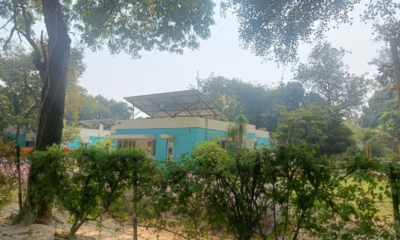
 Earth4 months ago
Earth4 months agoHow IIT Kanpur is Paving the Way for a Solar-Powered Future in India’s Energy Transition
-

 Space & Physics3 months ago
Space & Physics3 months agoSunita Williams aged less in space due to time dilation
-

 Learning & Teaching4 months ago
Learning & Teaching4 months agoCanine Cognitive Abilities: Memory, Intelligence, and Human Interaction
-

 Earth2 months ago
Earth2 months ago122 Forests, 3.2 Million Trees: How One Man Built the World’s Largest Miyawaki Forest
-

 Women In Science3 months ago
Women In Science3 months agoNeena Gupta: Shaping the Future of Algebraic Geometry
-

 Society5 months ago
Society5 months agoSustainable Farming: The Microgreens Model from Kerala, South India
















